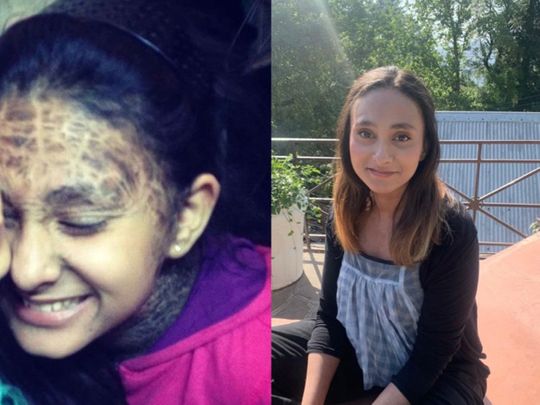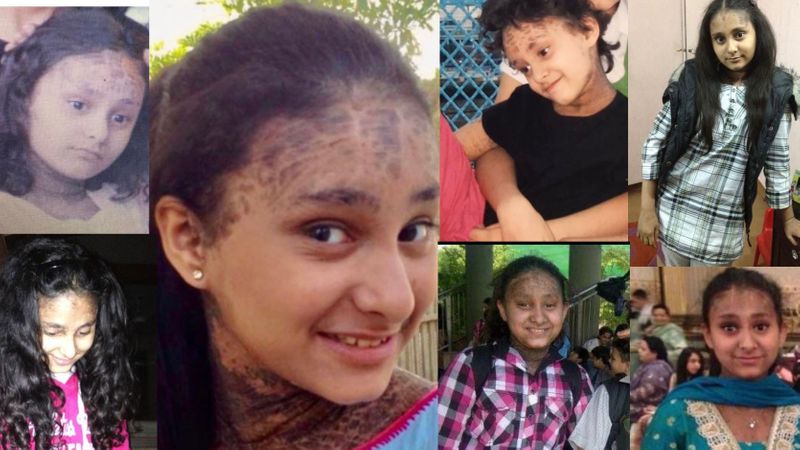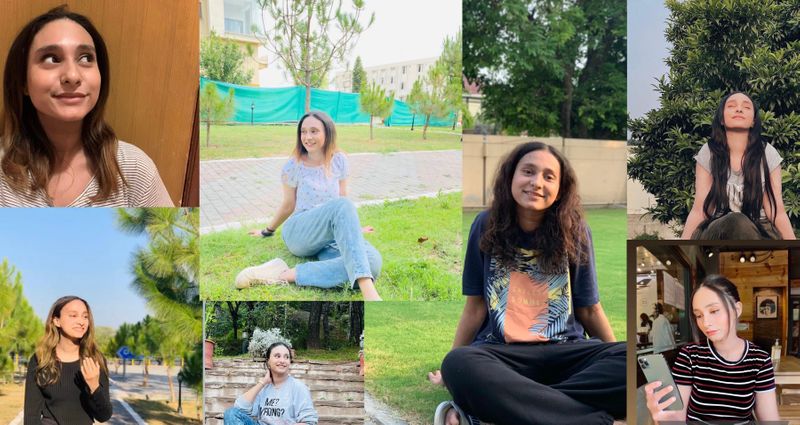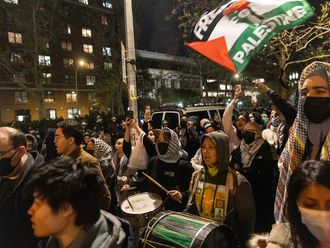
Laiba Mateen suffers from a skin disease.
For years, Laiba lived in shadows.
Last week, I met Laiba for the first time when my nephew Taimur, one of her closest friends, took me to her house to meet her. Tall, pretty, well-dressed, a giant smile flecking her every sentence, and a wicked sense of humour, there was no hint of any sickness about Laiba. That night, I talked to her for more than two hours. Throughout her story, I felt like crying. The story that had two parallel themes: suffering and unkindness.
Laiba suffers from ichthyosis vulgaris, a skin disorder she says is “characterized by dry skin with white, dark grey or brown small scales. It slows skin’s natural shedding process, causing chronic, excessive build-up of protein in the upper layer of skin. In summers, it worsens, but in winters my skin looks normal. I’d faint if I were to stand in sunlight for more than five minutes, as the oxygen circulation in my brain slows down, a process that can be dangerous.”
Suffering from ichthyosis vulgaris, since birth, Laiba’s life was her family—her parents Mateen Bessey and Rahat Mateen; sisters Nimra and Hamna; brothers Ghadif and Wasif—who doted on her. In the world outside her home, she had no one. Studying in one of Lahore’s elite schools, she faced ostracism at an age when children only know coexistence. Despite having a non-infectious skin disorder, she was treated like an outcast—a tiny human who didn’t have a single friend.

What shocked me about Laiba’s story was the failure of her teachers and school administration to explain to parents and students that her skin disorder was not infectious. Their apathy to her right to a normal existence in her school exacerbated the cruelty with which her class fellows and other students treated her. Sometimes cruelty emanates from ignorance or limited knowledge. Who was supposed to teach those children, and later teenagers, that a person suffering from a skin disease or any other disorder or disability needs love, friendship, and solidarity, not alienation, mockery, and outright hate? Parents, teachers, school administration, school principal. They all failed.
Pain in little Laiba’s eyes was visible like the marks on her forehead, but unlike the marks, her pain went unnoticed. The teenager Laiba’s life was an action replay of her younger years. One day she started the process of reshaping her narrative.
According to US National Organization for Rare Disorders, “Ichthyosis vulgaris is a fairly common disorder that affects approximately one in 250 persons in the United States.”
According to UK’s NHS, “Ichthyosis vulgaris is the most common type of inherited ichthyosis, affecting one in 250 people.”
Yet, for years, Laiba’s existence was that of an untouchable in a Dark Ages society.
Laiba says: “The lotion that I use clears my skin, but my skin is not cured. If I don’t put the lotion on my face or body my ichthyosis returns. This not a full cure but at least, for a while, I feel what others feel who don’t have marks on their face, neck, arms, anywhere.”
Before answering my questions, Laiba said: “Anything that I say is not to claim that my disease is exceptional, or that it caused me unbearable pain. Millions of people who’re born with disabilities or lose their limbs in an accident, people who become paralyzed, those who have cancer and other debilitating diseases, I marvel at their strength. The reason why I’m talking today is to highlight the pain that years of unkindness, scorn, alienation, and bullying caused me. My suffering was more emotional than physical. In a kinder, nicer world, like the one my family created for me, I’d have learned to accept, with a smile, my skin disorder. More than my skin disorder, people’s cruelty scarred me.”
In August 2022, Laiba—self-assured, bright, articulate, generous, talented, forgiving, optimistic, smiling—is the embodiment of how a young person turns her pain and disease into a positive force of empathy, understanding, loyalty, and inclusivity.
This is the story of young Laiba who lived in the shadows of a common, non-infectious skin disorder and the uncommon, virulent unkindness of everyone she met outside her home.
For Gulf News I asked Laiba Mateen a few questions:
Mehr Tarar: How old were you when you first noticed you looked different from other members of your family?
Laiba Mateen: I was born with this disorder. I was probably five when I noticed that I looked different from my family members and other people. I used to hide under my bed or in a corner whenever we had visitors. I’d hide behind my mom when we went out because people scared me. Some stared, some laughed, some asked questions: “Were you burnt?” “What’s wrong with you?” It all broke my heart. I was just a child, and I didn’t know why God made me different from others. Even in summers, I used to wear full sleeves so that no one could see my arms. I wore collared shirts so that no one could see my neck. Still, I failed because people stared and asked questions.
When was your skin disorder diagnosed? Was any treatment advised?
When I was born, it was diagnosed as dry skin that needed to be kept moisturized. Later, a specialist diagnosed it as ichthyosis. My mom didn’t know what it was and cried a lot because the doctor said it was incurable. Keep it moisturized, don’t let it get dry, just a skin problem, ten percent possibility of cure, but mostly it’s for life. It broke my mom’s heart, but she hoped one day my skin would heal.
That first snub, when a child refused to be your friend. Do you remember it?
I still remember the things that broke my heart. I made a friend in school, and I was really happy. My family was also happy that I had made one friend. She invited me to her house. I was so excited. At her home, I met her mother who didn’t seem happy to see me but being a child, I didn’t understand. I just had fun, and we played until my parents came to pick me up.
The next day she wasn’t talking to me, at all. I asked her what was wrong. She said, “My mother told me not to talk to you because you’re weird and you’ve this problem that might be contagious and dangerous for me. So she’s told me to stay away from you.” My one friend said that and left. I stood there, frozen, trying to process what had happened. It broke me. I finally made this one friend, and even she left me. I was seven years old.
Your life in school, if you had to write a story about it, what would be the title?
If I were to give my life story a title it’d be: “The key to my life? Patience.”
I never wanted to go to school. I always told my parents I was too scared to go out, but they always pushed me that I had to study, I must go out, have fun. That I was a child, and every child deserves to go to school. In school, there was a lot of staring and laughing; children didn’t know anything about my disease. They just never talked to me. They just mocked me, bullied me. Even when a teacher asked them to be friends with me, they refused, saying “She is dirty”, “It might be contagious”, “Was she burnt?” “How can God ever create people like her?” “She’s so ugly”.
Children were very mean to me.
I always sat in a corner watching my class fellows and others having fun. No one would even sit next to me because they thought I could transfer my “allergy” to them.
We had swimming classes in school. All the girls used to swim and have fun, while I sat on the side and watched them. I never told my parents. I was not allowed to swim because some children’s parents asked the school management that I should not be in water with their children, that it’s unsafe, and my disease could transfer to others. When my parents found out, they tried to convince me that I was allergic to chlorine. They did that so that I wouldn’t feel bad, but I always knew the real reason.
Throughout my childhood I had no friends. In school recess, everyone hung out with their friends while I sat in the classroom, eating my lunch alone, sitting next to a window watching them have fun. Prep to O levels, I didn’t have any friend. I was alone, asking God every day: why me? Why do I have to deal with this? Why does my family cry and is in pain because of me?
When I was in class five, I did make a friend who was nice to me; I was so happy to have someone who I could call my friend. I was so genuine to her, but after a few days she ghosted me. When I asked her what I did, she said that I wasn’t “famous”, and she wanted to be in a famous group in school.
Similar things continued to happen, in class five and onwards; whenever a girl talked to me for a day or two, the next day she ignored me because she thought I was “weird” looking, and no one knew me in school.
Boys never wanted to be friends with me or even talk to me. When a teacher used to make them sit with me or when we had joined tables, they mostly refused to sit next to me as they thought my disease was contagious and I was weird looking. How did I know that? They made bad faces when they looked at me.
Once, I wanted to get a haircut, but the salon folks refused to cut my hair. They were weirded out when they saw my head ichthyosis. I was fourteen. Later, I found another hairstylist who was happy to cut my hair.
My childhood was not like that of other children. It was scary. Stepping out of my house was the most difficult thing for me as I was so scared of the world.
At home, I used to cry all night long about how I really felt about myself while talking to God. The reason why I stopped telling my parents was when I told my mom about a boy who constantly mocked me, she talked to his mom who said, “Why do you send her outside? Keep her hidden so that no one can make fun of her.” That day I saw my mom crying so much I decided to never cry in front of my parents. I knew it broke their hearts.
So many acts of unkindness that deeply affected me inside out, but I’m glad I had my family who’s always supported me and was and is there for me.
Who was your first real friend in school?
When I joined a new school, I started making friends in class ten, but it was a slow process. My first real friend was Zaid. He was from Canada. We became friends in class nine in my old school. He never asked me about my skin issue and was always caring and nice to me. But he went back to Canada. I still miss Zaid because he was my first real friend. He’s gone but we remain in touch.
Something changed in 2017.
In 2017, I went for umra. My mom always said to me that God gave you this condition, and He’s the One who will cure you. Just have patience. This too shall pass. I went for umra, prayed a lot, cried a lot, and put Zamam water on my body. When we returned, I complained to my mom why God was not listening. I went to His house to pray and nothing changed. She always told me to have patience.
I remember that once I didn’t go to school for a week because I had a bad rash, and I couldn’t walk. When my teacher asked about my absence, I told her the reason. Her reply: “Stop using your skin problem as an excuse. Why do you always want sympathy? You’re not getting any so stop lying.” I came home and cried so much. I hugged my brother and said: “I’m done.”
After a few days, I started to research; all I found was that my skin disorder was incurable. I continued my research and found a lotion called G16. I ordered it online. When I applied it on a patch on my arm, in two days my skin started to clear. My family was so happy they ordered more. Since 2017, I’ve been using G16, which can be ordered from Amazon, and I’ve been better. Not cured but my skin stays cleared. If I stop using it, my condition returns. It’s good for now.

My patience always helped me. After I started to accept myself the way I was, I became stronger. Now if I have dark or light skin, I accept myself the way I am because only then people will accept me. If anyone asks me questions now, I’m not afraid to answer. If they stare, I ask them if anything’s wrong.
Those who are going through a similar illness, I just want to say I know you’re hurting, I was there once, I still am. I know you think the pain won’t ever go away but it will. I know it will because I don’t feel it anymore, and you won’t either. Just hang in there a little longer. Have faith in God and never give up. I waited seventeen years and was always told I wouldn’t get better, but here I am.
Yes, I had a lot of breakdowns. Yes, I used to question my existence. Yes, I used to ask my parents why me. And yes, I got depressed in 2016. But I never lost hope. I always cried and hoped that I’d be fine one day. The girl who used to hide and feared everyone and their questions is not scared anymore. It was because I accepted myself the way I am. I’m happy now.
One thing though: if I didn’t have my family’s support, I would’ve harmed myself. Trust me, it was scary.
Do you have anything to say to those in your school who treated you like a leper, bullied you, ostracized you, alienated you, and judged you without knowing you or your malady?
People who bullied me all my childhood should know that their words broke me from the inside. They made me conscious about myself, they made me insecure, they made me want to stay home and not go to school. Because each day was terrible for me. I was bullied every day. At night, I used to lock my room, think about my day and cry. All night. I didn’t tell my parents because I knew they’d be deeply hurt and give me the lecture: be strong, be brave. I used to give that lecture to myself.
Now, at 21, I’m stronger, but I wasn’t then. I was a child. I know the bullies have moved on and they may not even remember what they did to me, but I do. Because I lived it. Those days were terrible because they broke me. They really did.
I do have a message for them. They’ll have children one day, and I want them to teach their children to accept other children the way they are, be kind to everyone, and not make fun of anyone. Imagine if you’re a parent and your child is being bullied, how’d you feel? It will break you. I remember how people who bullied me made me feel broken, but my family’s love and my constant introspection made me stronger, confident, hopeful.
But…I still can’t forget what happened to me. I’m sorry, I’m crying. [Laiba stopped speaking and began after a few seconds.] I still can’t forget but I try to move one. But then the past hits me and I become sad again.
What is Laiba’s next big dream?
As a child, I always wanted to live in a colder place. Summers aren’t good for me. I want to move to Canada, UK, or Iceland. That’s one dream.
My big passion is editing videos and filmmaking, so I want to go abroad to study these fields. One day, I want to write a story, a screenplay and make a film. I hope I’ll be a successful filmmaker, inshaAllah. That’s my other dream.
I still hope for the best. I’ve enough patience to believe that I’m going to succeed in my dreams.
Writer’s note: Laiba cried while answering almost all my questions. Her pain will stay with me. That scarred scared bullied mocked lonely little girl still lives within the lovely self-assured smiling Laiba Mateen. That little girl still lives in shadows.











